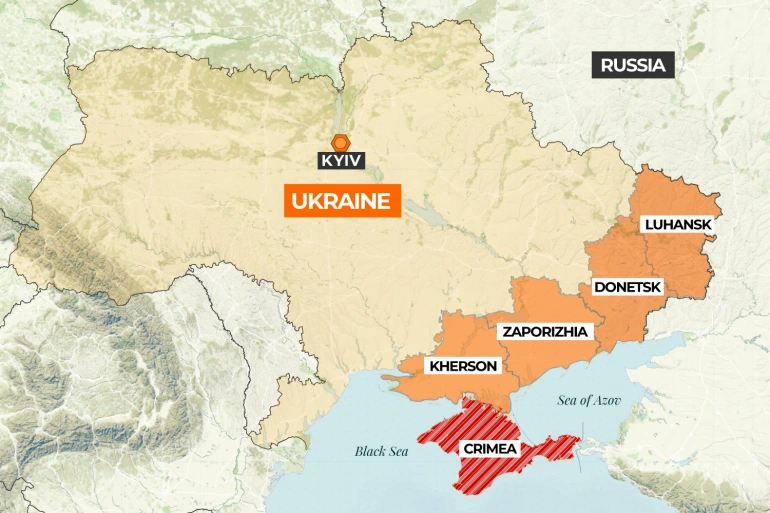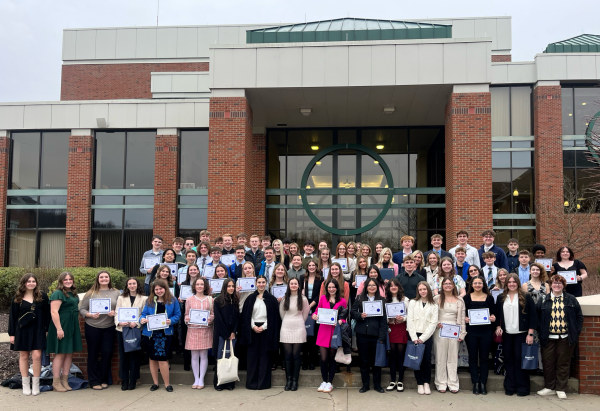Russia annexes Ukrainian territory
This image was accessed via Google Images under the Creative Commons License
The map shows the Russian-occupied territory of Ukraine in September 2022. The referendums were presented in the provinces partially held by Russia, shown in orange. Ukraine’s liberation of occupied territories is shown through the blue arrows.
The Russo-Ukrainian conflict has faded from popular consciousness, but the war has continued on. In the past weeks, the war has taken a new form with Russian annexations of Ukrainian territory.
The Russo-Ukrainian war has an unclear origin point for many Americans, but the cause of the war centers over the Donbas region of Ukraine, a region held by pro-Russian separatists who want to join Russia. Russia has also previously taken over the Crimean territory and supported separatists in the Donbas Region. Those factors, plus Ukraine’s political alignment turning from Russia to the West has sparked the invasion of Ukraine. The separatists in Ukraine then turned to rebellion due to economic and political differences from Ukraine.
German teacher, Herr McLaughlin commented on the motives of the separatists: “There are some people who love the Soviet Union, and don’t want anything to change. In the new Ukraine, not everyone has equal wealth like they did during the Soviet Union. A lot of families remember the Soviets nostalgically.”
For all involved, the Russian invasion has cost much for both sides. Ukraine’s strong defense against the invading Russian forces has stalled the advance, and Ukraine has taken back a large amount of territory. With reports of Russian atrocities in the occupied territories, Ukrainian forces have maintained strong morale against their enemy. The war has caused a total collapse in the Russian economy due to harsh sanctions against them.
The invasion has caused Ukraine to gain an advanced admissions process to NATO. In response, Russia has taken further steps to cement its gains in Ukraine by presenting referendums for annexation to the territories of the Donbas, Luhansk and Donetsk, and two other occupied territories, Kherson and Zaporizhzhia, which did not have substantial separatist control before the invasion.
Russian President Vladimir Putin has sought to both further link Russian forces and cement its gains. Putin’s reason for accepting these referendums is to cement control of claimed territory. In the name of this security, however, Russian troops have brutally suppressed the civilians in these territories.
Multiple news outlets have reported on brutal acts against the Ukrainian citizens refusing to vote in the referendums, including abductions and beatings of dissenters.
“The Independent” reported the situation in Donbas: “…Terrified Ukrainians have told of being abducted at gunpoint from their homes, held in solitary confinement and tortured for refusing to vote in Russia’s ‘sham’ referendums.”
This increased security, however, has resulted in Russia regarding the annexed territories as its own, vowing to protect its lands “at any cost,” with experts speculating on whether Russia may use nuclear weapons against Ukraine. Despite the widely condemned annexations, both Ukraine and its supporters in the West have retained their morale, and Ukraine has continued to liberate its land and citizens from the occupying forces.
These referendums are not likely to change anything in the international relations between the two nations, as the West is unlikely to take further action against Russia. Further action from the United States could threaten the Baltic Nations and Poland with possible invasions.
Hannah Tiederman, a senior and foreign exchange student at THS gave a unique perspective as a German citizen about further actions against Russia: “I think [that the West] should but I’m not sure that they will, Putin is really dominant, and I am not sure they want to risk attacks.”
Tiederman reiterated that while both Germany and the United States have supported Ukraine, these nations do not want to risk their own defense or soldiers’ lives to fight against Russia. Their defenses have already been risked, however, as the Nord Stream pipeline in the Baltic Sea has been attacked, reportedly by Russian agents.
Even though the Ukrainians and the Ukrainian government have continued to fight against the Russians, the war is unlikely to end anytime soon as Ukraine has held firm on its territorial integrity and President Putin has refused to negotiate or withdraw from Ukraine. The invaded nation has managed to maintain an offensive front against Russia, thanks to Western support and strong morale.
Aiden is a senior and is very excited to be writing for The Hiller this year. Outside of school, he likes to hang out with friends and work at Chipotle....






